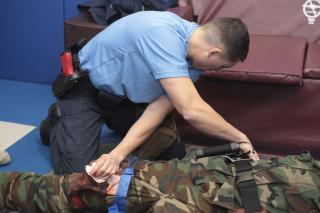
In addition to training federal law enforcement students, the Federal Law Enforcement Training Center (FLETC) also has a robust mission to provide training to our nation’s state, local and tribal law enforcement officers.
The State, Local and Tribal Division (SLTD) program was originally established on October 1982 in response to the findings of the Attorney General's Task Force on Violent Crime. Task Force members had serious concerns about the rising crime rate in the United States and urged that the Federal Government take a more active role in providing law enforcement training for state and local agencies.
FLETC’s SLTD program trained more than 4,500 state, local, tribal and territorial students last fiscal year, alone.
The SLTD conducts law enforcement training on a variety of topics across the country. Some of the most popular classes include the Active Shooter Threat Training Program, Active Shooter Threat Instructor Training Program, Basic Tactical Medical Instructor Training Program, and Tactical Medical for First Responders.
Since the full implementation of Tactical Medical training program, there have been numerous instances of the training being applied and directly saving lives in the field. Officers receive a minimum of eight hours of training in basic tactical medical procedures and leave the program with a standardized Individual First-Aid Kit (IFAK). The IFAK contains key items to be used for immediate life saving measures during evolving, sometimes austere environments.
Photo above: A FLETC student applies direct pressure and a tourniquet to simulated wound during a class. (Photo courtesy of FLETC/DHS)
Feedback we have received from local partners indicate that students apply the skills/IFAK within hours or days of graduation. Recent application of these skills include a student who used the new skills to apply a tourniquet to control bleeding for the victim of domestic abuse. Still, another student used a chest seal to treat the victim of multiple gunshots as the result of a drug deal gone bad. There is also the officer who used a hemostatic agent to treat his partner who had been shot. The same officer used extraction techniques taught in the program to secure his partner’s weapon and remove him from a second floor window.
While these success stories highlight the program’s importance and applicability, it also applies to “everyday” scenarios. For example, the student who graduated from a pre-deployment program and was attending a family function, only to have a family member suffer a major laceration to his upper thigh. The student was able to apply the tourniquet issued with his IFAK and stop the bleeding. This act in a seemingly harmless situation highlights the skills taught in the Tactical Medical program and their importance in everyday life, not just law enforcement situations.
In addition to the numerous stories like the ones above, FLETC routinely receives feedback on how the program has impacted the everyday lives of the officers. Officers have started re-thinking the location of the first-aid kits in their vehicles to ensure they are accessible and known to other officers. They have started carrying the lifesaving gear with them and not leaving it in the vehicle. When entering an area, they are evaluating methods to control bleeding, as well as scanning for threats, etc. As a result, the Tactical Medical program is positively impacting the daily activities of officers across the country in ways not seen in many years and saving lives.
The advanced training programs and workshops offered at FLETC are developed with the advice, assistance and support of federal, state, local, tribal and campus law enforcement agencies and experts. Training is continuously updated to ensure accuracy and relevance to today’s issues and is certified by each state’s Peace Officer’s Standards and Training (P.O.S.T.) if/when certification is available.
###
Federal Law Enforcement Training Centers
Protocol & Communications Office
Contact: 912-267-2447

